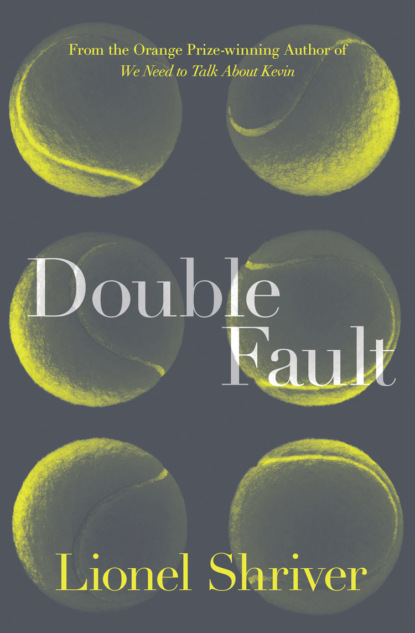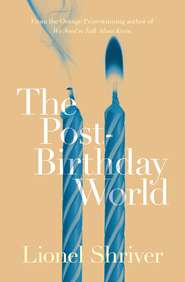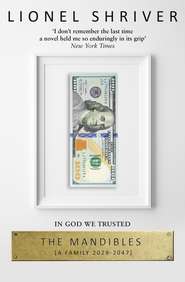По всем вопросам обращайтесь на: info@litportal.ru
(©) 2003-2024.
✖
Double Fault
Автор
Год написания книги
2019
Настройки чтения
Размер шрифта
Высота строк
Поля
He might have wanted to ask who or why, but Max Upchurch had made millions of dollars on self-control. He shrugged. She left.
In their on-court session the following afternoon, Max didn’t refer to the evening’s tiff, and no one observing the two would have picked up on anything amiss in this fruitful, vigorous coach-client relationship. His very capacity to put sentiment aside when business required a cool head may have contributed to his looking his age, though if Willy didn’t miss her guess the faculty faintly depressed him.
But Willy knew the difference. Since May a formality had invaded their sessions. Briskness prevailed, though the tightening of the interval between drills may have only been a matter of fifteen seconds. Max no longer tucked strands into her bandanna but ordered gruffly, “Get that hair out of your face.” He was hard on her—always had been—but now his criticism was knifed with genuine derision. He seemed glad for her mistakes, and Willy submitted to his abuse with uncharacteristic meekness.
They were working on corner-to-corner backhand drives, and as Willy spotted a peaked hairline sifting across the field to their court she bent her knees lower, drew her backswing more quickly, and forced the whole of her weight onto her right foot. The ball skimmed an inch over the net, and scooted from underspin.
“That’s more like it,” Max commended, though he sounded annoyed.
She put something special on the next one. It kissed the corner and skipped at a cockeyed angle beyond Max’s racket. By the gate, the gangly Jew whistled, and Willy realized that she was showing off.
“I’m afraid we’ll be another hour!” she cried.
Willy had orchestrated this exhibition, suggesting Eric take a train that would get him into Sweetspot before her afternoon’s drills were done. Now she felt obvious, demonstrating what a real pro hits like with a real pro coach. The ensuing hour was painful, as her visitor bounced his back against the adjacent court’s fence. Rather than gawk in slack-jawed awe, he looked put out. She could as well have been a little girl oppressing a house guest with her piano études. Moreover, while she’d intended Eric’s visit to accustom Max to her new admirer, the ploy abruptly appeared tactless. From the age of five Willy had learned to control a tennis ball, and had virtually abandoned the more challenging project of managing people with the same aplomb.
Between drills, Willy bent and grasped her calves, bringing her forehead to her knees. The tension of the antagonism she’d contrived was tightening her tendons. Max rolled his eyes and flicked his finger, commanding her to the net post. Pulled hamstrings could put you out of the game for weeks; Max took no chances.
As she braced against the net post, Max kneeled at her feet and cradled an ankle on his shoulder. Gradually he stood nearly upright, which brought his groin level with her open crotch. Willy grunted at the ache in her thigh. As Max lowered her leg and prepared to lift the next, she glanced over at Eric, who was intently rewrapping his grip.
When the recital was mercifully over, she abbreviated introductions. “Max Upchurch, Eric Underwood.”
Eric’s mouth twitched.
Max skipped the so-you’re-a-friend-of-Willy’s-are-you and how-do-you-two-know-each-other and went straight to all he cared about in regard to anyone. Nodding at Eric’s racket, he squinted. “You play?”
“No, I use this to catch butterflies.” Deadpan.
Max sprang his palm against his strings. “How about a game?” The casual inflection was a lie. He had never challenged anyone to a match casually in his life.
In reply, Eric began whisking practice balls to the next backcourt, implying that Willy was to pick them up.
Willy hated watching other people play tennis. It consumed her with jealousy. Though she’d flagged minutes earlier, now she summoned a second wind, and how dare anyone abscond with her partner while she still had a stroke left in her?
Thus as the two men warmed up—Eric insolently relaxed, Max inscrutably impassive—Willy could not tell for which player she was rooting. She detested them both. This sucked: sulking cross-legged on the sidelines, the court hard and hot. As the match commenced, Willy gazed at banking seagulls overhead. However, it was impossible to screen out the familiar grunts that were Max’s version of flattery, or the pooch-puh-poom-puh-poom-puh-poom-poom-poom of a protracted point.
In that Willy’s calculation of a tennis score was automatic, neglecting to keep track of who won what took a concentration of its own. (Gentlemen did not announce the score.) She’d have expected Max to dispatch the parvenu in thirty-five minutes, though once Willy had realigned her racket strings and bounced a ball off the face five hundred times without missing, the half hour was long past and those two were still batting away. Max was moist. Eric was playing plenty of trash, but it sometimes worked. At last, after another point during which she had found a rally two courts away more compelling, she turned to find them shaking over the net, stiffly.
Willy picked herself up, dusting off her shorts, and the two gladiators ambled to their bags.
“You’re a pro,” said Max.
“Yes,” said Eric.
“Ranked?”
“972.”
Max cocked his mouth. “Ways to go.”
“I’d never picked up a racket with any seriousness until I was eighteen. My first year at Princeton I was on the basketball team.”
“Eighteen. Late.”
“As in better than never.”
They were both ignoring Willy, who was looking daggers at her new friend, the pro. She should have sensed it. At her stoop, his right palm had scratched her neck with lumpy calluses. He had not arrived at Sweetspot toting one racket but three, and as he zipped the Prince into its expensively padded case, she recognized the classic asymmetry of his arms: the right so comparatively overdeveloped that it suggested a skewed proportion of mind, as if a tennis player placed too much weight, literally, on one side of his life.
“I’ll show you the showers,” she offered. Eric didn’t respond. His motions were jagged, his manner curt. The last time he was hammered he’d been jubilant; perhaps she was to infer from this truculence that he’d won the match.
As she traipsed with her guest toward the locker rooms, Max motioned her back. “I know his strokes are rough,” he warned her quietly. “Sleazy. But underneath the junk, that kid can play.”
Trudging across the field, Eric walked ahead, indulging the naturally extreme stride of a man at least six-two. They were trapped in the estranged silence of two people who had played tennis, but not with each other. And Willy could hardly make conversation about a match she had declined to follow so belligerently that she didn’t know who had won.
“So what, we’re supposed to shovel institutional slop with a bunch of pampered, brain-dead sportsmen of tomorrow?”
“There’s an Italian place in town. Max would lend us a car.”
“Upchurch would lend you a car.” Eric kicked the ragweed.
“For a sport in which you apparently have aspirations yourself, you don’t seem to have much respect for the folks who play it.”
“You respect these people?” he asked incredulously.
“Respect may be the wrong word. But the game itself—”
“Is a pretty doable business. Sometimes you beat people at their own game not because you think it’s so all-fired marvelous but because you don’t.”
Scurrying to keep up, Willy was mesmerized by the long, loose legs eating the ground with such blithe assurance. Surely it behooved her to defend the crowd in which she ran, but for a moment Eric’s contempt was liberating. He was right, in a way. The lofty regard in which most pro players held their calling was insupportably pompous. The majority of her “colleagues” were narrow, fatuous, and catty. All they wished for Willy was defeat, and in truth she owed them nothing. Though she’d always tried to keep the sport and its practitioners separate in her head, Eric lured her with the giddy freedom of seeing even tennis itself as “a pretty doable business,” a skill she had mastered but did not master her. For Willy’s reverence for tennis was a tyranny—the more gravity she gave it, the more it crushed her when she fell short of the sport’s uncompromising standards. Any man who found the diversion ordinary would have a peculiar power.
Eric waved his hand over the manicured lawns. From this distance the school’s tidy Colonial Revivals looked contrived, self-consciously New England, precious. “This crowd makes me puke.”
“Then why would you yourself want—?”
“To whip them where it hurts most.”
“You don’t think there’s something special about someone who can play spectacular tennis?” asked Willy, nervous that to join him in denouncing this crew was not necessarily to escape being lumped in with them as well.
“I think there’s something special about the way you play tennis.” He stopped. “Or maybe I just think there’s something special about you, and fuck the tennis.”
Willy had long regarded herself and her strokes as synonymous. “Love me, love my game,” she said warily.
He conked her lightly on the back of the head with the heel of his hand. “You’re warped.”
“That waitress knows your name,” Eric charged.
“There’s not much to choose from in Westbrook.”
“Who’d you come here with?”











